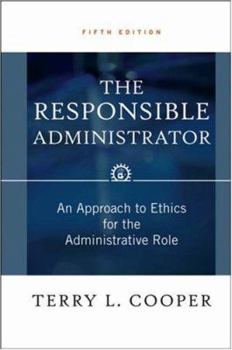The Responsible Administrator: An Approach to Ethics for the Administrative Role
Select Format
Select Condition 
Book Overview
Praise for the Fifth Edition of The Responsible Administrator "Cooper's fifth edition is the definitive text for students and practitioners who want to have a successful administrative career. Moral... This description may be from another edition of this product.
Format:Hardcover
Language:English
ISBN:0787976512
ISBN13:9780787976514
Release Date:August 2006
Publisher:Jossey-Bass
Length:328 Pages
Weight:0.44 lbs.
Dimensions:1.2" x 6.3" x 9.0"
Customer Reviews
4 ratings
The Responsible Administrator
Published by Thriftbooks.com User , 15 years ago
This text should be required for all students studying public administration, whether at the undergraduate or graduate level. It offers relevant and practical solutions to local, state, national and global problems. Students and practitioners of public administration will encounter a new landscape that informs them of how to be an active and effective citizen in the governance of the US government from all levels of government. It is simply a good read. Terry Cooper knows the importance of combining scientific and normative values in the administration of our governments.The Responsible Administrator: An Approach to Ethics for the Administrative Role
Good Review
Published by Thriftbooks.com User , 15 years ago
I received this book in a timely manner. It was in good condition. The readings in it were a nice look at ethics in Public Administration.
good for the book-case
Published by Thriftbooks.com User , 22 years ago
I wouldn't have read it if I didn't have too, but since I did, it was pretty good. As an administrator, I will keep this on my book-case..Ha ha.
Wanted: Administrators Who Can Juggle Responsibly
Published by Thriftbooks.com User , 25 years ago
Terry L. Cooper's The Responsible Administrator will someday (if not already) be listed by successful and respected public administration practitioners as one of the books that had the most influence on their careers. Those who list it as such will probably have a well-worn copy on their library shelf because it is not a piece that is read through once - even very carefully, word for word - with the reader then declaring, "Now I see how it should be done." Rather, it is a book that increases in utility as one's experience in decision-making and working through administrative ethical dilemmas increases. For this reason, its greatest impact will be on practitioners, as opposed to students and academics. Nevertheless, although it is certainly realistic about, and empathetic with the day-to-day decision-making and ethical conflicts faced by public administrators, it is nonetheless theoretically thorough and academically thoughtful. Cooper is obviously a scholar of the philosophical and moral issues surrounding public administration and decision making. In addition to his own thoughtful analysis and theory, he provides a comprehensive and thorough review of literature relating to each item of discussion, as well as on-point case studies that amplify the ethical complexities and difficulties challenging today's administrators. Fortunately for practitioners, he is not content to conclude his treatise with conceptual, theoretical and philosophical analysis of ethical problems, but suggests a design approach for dealing with both the short-term decision-making situations and the long-term organizational, political, legal, cultural, policy and procedural issues faced by administrators as they attempt to make balanced and ethical decisions. The manner in which Cooper presents his case studies allows the reader to interact and find conceptual application. Each one is "based on reality and fictionalized only slightly to protect those who wrote them" (p. xxi), and is very illustrative and thought provoking regarding the ethical problems being discussed. However, they are always left unresolved. Cooper says, "To indicate an outcome [in each case] would diminish the experience of dilemma they are calculated to evoke" (p. xxi). This emphasizes the ultimate purpose of The Responsible Administrator which "is to illuminate the ethical situation of the public administrator and cultivate imaginative reflection about it - not to prescribe a particular set of public service values" (p. xxi). Although the volume leaves no doubt in the reader's mind that its author has strong opinions and a well-established belief structure, it makes no attempt to proselytize the reader with a substantive system of moral values or standards for public administrators. The premise of The Responsible Administrator is that public administrators, in fulfilling their administrative responsibilities, are faced with complex and ambiguous ethic





